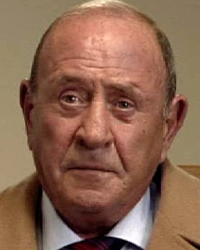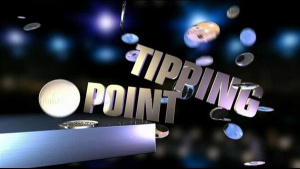Who Wants to Be a Millionaire? is an international television game show franchise of British origin, created by David Briggs, Mike Whitehill and Steven Knight. In its format, currently owned and licensed by Sony Pictures Television, contestants tackle a series of multiple-choice questions to win large cash prizes in a format that twists on many game show genre conventions – only one contestant plays at a time, similar to radio quizzes; contestants are given the question before deciding whether to answer, and have no time limit to answer questions; and the amount offered increases as they tackle questions that become increasingly difficult. The maximum cash prize offered in most versions of the format is an aspirational value in local currency, such as £1 million in the UK or ₹75 million in India.

Hollywood Squares is an American game show in which two contestants compete in a game of tic-tac-toe to win cash and prizes. The show piloted on NBC in 1965 and the regular series debuted in 1966 on the same network. The board for the game is a 3 × 3 vertical stack of open-faced cubes, each occupied by a celebrity seated at a desk and facing the contestants. The stars are asked questions by the host and the contestants judge the truth of their answers to gain squares in the right pattern to win the game.

Match Game is an American television panel game show that premiered on NBC in 1962 and has been revived several times over the course of the last six decades. The game features contestants trying to match answers given by celebrity panelists to fill-in-the-blank questions. Beginning with the CBS run of the 1970s, the questions are often formed as humorous double entendres.

Southern Television was the ITV broadcasting licence holder for the South and South-East of England from 30 August 1958 to 31 December 1981. The company was launched as 'Southern Television Limited' and the title 'Southern Television' was consistently used on-air throughout its life. However, in 1966, during the application process for contracts running from 1968, the company renamed itself 'Southern Independent Television Limited', a title which was used until 1980 when the company reverted to its original corporate name. Southern Television ceased broadcasting on the morning of 1 January 1982 at 12:43am, after a review during the 1980 franchise round gave the contract to Television South.

Blockbusters is a British television quiz show based upon an American quiz show of the same name. A solo player and a team of two answer trivia questions, clued up with an initial letter of the answer, to complete a path across or down a game board of hexagons.

Name That Tune is an American television music game show. Originally created and produced by orchestra conductor Harry Salter and his wife Roberta Semple Salter, the series features contestants competing to correctly identify songs being played by an on-stage orchestra or band.

Ant & Dec are a British television presenting duo consisting of Anthony McPartlin and Declan Donnelly from Newcastle upon Tyne. Formed after them meeting as child actors on CBBC's drama Byker Grove, they performed together as pop musicians PJ & Duncan, the names of their characters from the series.
Bullseye is a British darts-themed television game show created by Andrew Wood and Norman Vaughan. The show features three pairs of contestants, each consisting of an amateur darts player and a quizzer, competing in darts games and quizzes to win cash and prizes.

Runaround is a children's television game show produced by Heatter-Quigley Productions. The program was hosted by ventriloquist and voice actor Paul Winchell, airing Saturday mornings on NBC from September 9, 1972, to September 1, 1973.

Michael Reid was an English comedian, actor, author and occasional television presenter. He played the role of Frank Butcher in the soap opera EastEnders and hosted the children's game show Runaround. He was known for his gravelly voice and strong London accent.
This is a list of British television-related events in 1976.

Catchphrase is a British game show based on the short-lived American game show of the same name. It originally aired in the United Kingdom between 12 January 1986 and 23 April 2004. A revival premiered on ITV1 on 7 April 2013 and is still running as of 2024.

Tic-Tac-Dough is an American television game show based on the paper-and-pencil game of tic-tac-toe. Contestants answer trivia questions to put up their respective symbol, X or O, on a tic-tac-toe board. Three versions were produced: the initial 1956–59 run on NBC, a 1978–86 run initially on CBS and then in syndication, and a syndicated run in 1990. The show was produced by Barry & Enright Productions.

Who Wants to Be a Millionaire? is a British television quiz show, created by David Briggs, Steven Knight and Mike Whitehill for the ITV network. The programme's format has contestants taking on multiple-choice questions based upon general knowledge, winning a cash prize for each question they answer correctly, with the amount offered increasing as they take on more difficult questions. If an incorrect answer is given, the contestant will leave with whatever cash prize is guaranteed by the last safety net they have passed, unless they opt to walk away before answering the next question with the money they had managed to reach. To assist in the quiz, contestants are given a series of "lifelines" to help answer questions.
Connections is a British game show, devised and produced by John Huntley, that aired on ITV from 26 April 1985 to 6 July 1990. The daytime version is hosted by Sue Robbie from 1985 to 1988 and Simon Potter from 1989 to 1990, while the primetime version is hosted by Richard Madeley.
Sale of the Century was a British game show based on a US game show of the same name. It was first shown on ITV from 9 October 1971 to 6 November 1983, hosted by Nicholas Parsons. Special Celebrity Sale of the Century editions aired occasionally, starting on 2 January 1981 with Steve Jones as host.

Wheel of Fortune is a British television game show based on the American show of the same name created by Merv Griffin. Contestants compete to solve word puzzles, similar to those used in Hangman, to win cash and prizes. The title refers to the show's giant carnival wheel that contestants spin throughout the course of the game to determine their cash and/or prizes.
The Saturday Banana is a Saturday morning children's television show produced by Southern Television for ITV and presented by Goodies star Bill Oddie. Oddie also wrote and sang the theme tune. The series began on 8 July 1978, running through the summer and continuing up to December, with a Christmas Special.
This is a list of British television related events from 1975.

Tipping Point is a British quiz show that aired on ITV since 2 July 2012, the programme is presented by Ben Shephard and features three players answering questions on the subject of general knowledge in order to win counters, which they use on a large coin pusher arcade-style machine, that represent (mainly) cash prizes.













